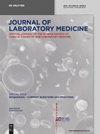Improving turn-around times in low-throughput distributed hematology laboratory settings with the CellaVision® DC-1 instrument
IF 1.1
4区 医学
Q4 MEDICAL LABORATORY TECHNOLOGY
引用次数: 0
Abstract
Abstract Objectives Digital pathology is becoming standard in the delivery of timely, high-quality clinical services, inclusive of morphological assessment in laboratory hematology. While many digital hematology systems are designed with high-throughput in mind, CellaVision ® has recently developed a low-throughput instrument, the CellaVision ® DC-1. The utility of the CellaVision ® DC-1 was tested in a distributed laboratory system, with a focus on turn-around times (TATs). Methods We evaluated the TATs of a CellaVision ® DC-1 workflow, with specimens originating in a small spoke-laboratory referring materials to a central hub-laboratory. Our spoke-laboratories perform on-site complete blood counts (CBC’s) and manual peripheral blood smears (PBS’s), with complex cases referred for review to the hub-laboratory. Baseline TATs were collected, followed by prospective evaluation of 21 cases analyzed using the CellaVision ® DC-1, with digital review by spoke-laboratory staff in concert with remote review by hub-laboratory staff. The TATs for the same 21 cases by standard manual assessment were compared. Results Improvement in the distribution of TATs using the CellaVision ® DC-1 was noted relative to the retrospective spoke-laboratory data (Mann–Whitney U=26, p<0.0001) and the parallel manual PBS review (Wilcoxon W=190, p<0.0001). The CellaVision ® DC-1 permitted a significant reduction in case-assessment times (Wilcoxon W=105, p=0.0001). No significant diagnostic discrepancies were identified during the testing timeframe. Conclusions We describe a real-world assessment of the CellaVision ® DC-1 analyzer in a distributed (hub-and-spoke) laboratory network, linking low-volume laboratories to high-throughput sites. Our evaluation highlights significant improvements in case TATs with a CellaVision ® DC-1 assisted digital pathology workflow.改善低通量分布式血液学实验室设置与CellaVision®DC-1仪器的周转时间
目的数字病理学正在成为提供及时、高质量临床服务的标准,包括实验室血液学形态学评估。虽然许多数字血液学系统在设计时考虑到高通量,但CellaVision®最近开发了一种低通量仪器CellaVision®DC-1。CellaVision®DC-1的实用性在分布式实验室系统中进行了测试,重点是周转时间(tat)。方法:我们评估CellaVision®DC-1工作流程的TATs,将来自小型辐条实验室的标本转到中心中心实验室。我们的口腔实验室进行现场全血细胞计数(CBC)和手工外周血涂片(PBS),复杂病例转介到中心实验室审查。收集基线tat,然后使用CellaVision®DC-1对21例病例进行前瞻性评估,由语音实验室工作人员进行数字评估,同时由中心实验室工作人员进行远程评估。采用标准人工评估方法对21例患者的TATs进行比较。结果与回顾性口腔实验室数据(Mann-Whitney U=26, p<0.0001)和平行手动PBS评估(Wilcoxon W=190, p<0.0001)相比,使用CellaVision®DC-1可改善tat分布。CellaVision®DC-1可显著减少病例评估时间(Wilcoxon W=105, p=0.0001)。在测试期间没有发现显著的诊断差异。我们描述了CellaVision®DC-1分析仪在分布式(中心辐射式)实验室网络中的真实评估,将小容量实验室连接到高通量站点。我们的评估强调了使用CellaVision®DC-1辅助数字病理工作流程的病例tat的显着改进。
本文章由计算机程序翻译,如有差异,请以英文原文为准。
求助全文
约1分钟内获得全文
求助全文
来源期刊

Journal of Laboratory Medicine
Mathematics-Discrete Mathematics and Combinatorics
CiteScore
2.50
自引率
0.00%
发文量
39
审稿时长
10 weeks
期刊介绍:
The Journal of Laboratory Medicine (JLM) is a bi-monthly published journal that reports on the latest developments in laboratory medicine. Particular focus is placed on the diagnostic aspects of the clinical laboratory, although technical, regulatory, and educational topics are equally covered. The Journal specializes in the publication of high-standard, competent and timely review articles on clinical, methodological and pathogenic aspects of modern laboratory diagnostics. These reviews are critically reviewed by expert reviewers and JLM’s Associate Editors who are specialists in the various subdisciplines of laboratory medicine. In addition, JLM publishes original research articles, case reports, point/counterpoint articles and letters to the editor, all of which are peer reviewed by at least two experts in the field.
 求助内容:
求助内容: 应助结果提醒方式:
应助结果提醒方式:


